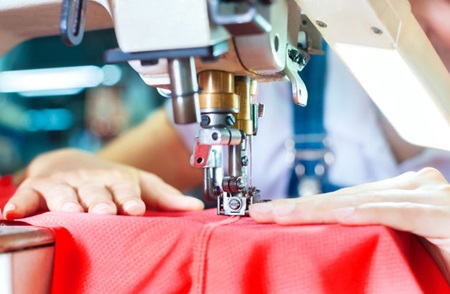
Twenty years after the US and Viet Nam established diplomatic relations, bilateral trade turnover has risen 80-fold, and is expected to boom after the Trans Pacific Partnership agreement, currently under negotiations, takes effect.
Twenty years after the US and Viet Nam established diplomatic relations, bilateral trade turnover has risen 80-fold, and is expected to boom after the Trans Pacific Partnership agreement, currently under negotiations, takes effect.
 |
| During the next 10 years, the US market share for Vietnamese garments is expected to double under the TPP agreement. |
In 1995, bilateral trade volume was reported at US$500 million, and this year, it is estimated that it would be $40 billion. Within ten years, it could reach $50 or $60 billion.
And when negotiations on the Trans Pacific Partnership agreement conclude, the trade figures could climb even higher. Besides the US and Viet Nam, the trade agreement includes Australia, Brunei, Canada, Chile, Japan, Malaysia, Mexico, New Zealand, Peru and Singapore, representing 40 per cent of the global GDP.
Rena Bitter, general US consul general to HCM City, who spoke at a conference yesterday organised by the Viet Nam – US Association in HCM City on trade relations, said that 20 years ago the two countries could not have imagined the achievements of today.
She cited a recent Pew Global Attitudes survey that said 78 per cent of Vietnamese expressed a favorable view of the US.
The percentage was much higher for Vietnamese under 30 years of age, she said.
The US, with a market valued at $20 trillion, is now the No 1 market for Vietnamese exports.
Luong Van Tu, of the Viet Nam – US BTA Joint Committee, said that with TPP membership Viet Nam would improve management skills and have more access to capital and technology.
More importantly, it would have a large market for consumer goods.
He said that US – Viet Nam bilateral trade revenue would rise quickly over the next 20 years under the TPP.
Le Phuoc Vu, chairman of Hoa Sen Group, a large steel company, said with closer ties and increasing bilateral trade, Viet Nam could become the No. 1 exporter of industrial goods to the US.
"The US market has a lot of potential. With TPP, our exports to US could increase several times over," Vu said.
"If an American looks down at the label on his or her shoes, there's a 1-in-10 chance it will read Made in Viet Nam. Same for the shirt on his or her back," he said.
Clothing tops the list of Vietnamese export to the US. Viet Nam is now the second leading provider of clothes to the US after China.
Le Quoc An, consultant for the Viet Nam Textile and Apparel Association, said last year Viet Nam exported $10 billion of fabric and clothes to the US market, which represents a 9.2 percent import market share in the country.
Apparel and textile exports were only $1 billion in 2002 when the US – Viet Nam Bilateral Trade Agreement took effect.
Over the last 10 years, Vietnamese clothes exported to the US increased 398 per cent with an annual growth of 15 per cent, he said.
During the next 10 years, the US market share for Vietnamese garments is expected to double under the TPP agreement.
An said that US billionaire Wibur Ross had decided to invest in the garment and textile industry in Viet Nam.
The US is one of Viet Nam's biggest investors, along with Japan, South Korea, Taiwan and Singapore.
(Source:VNS)



